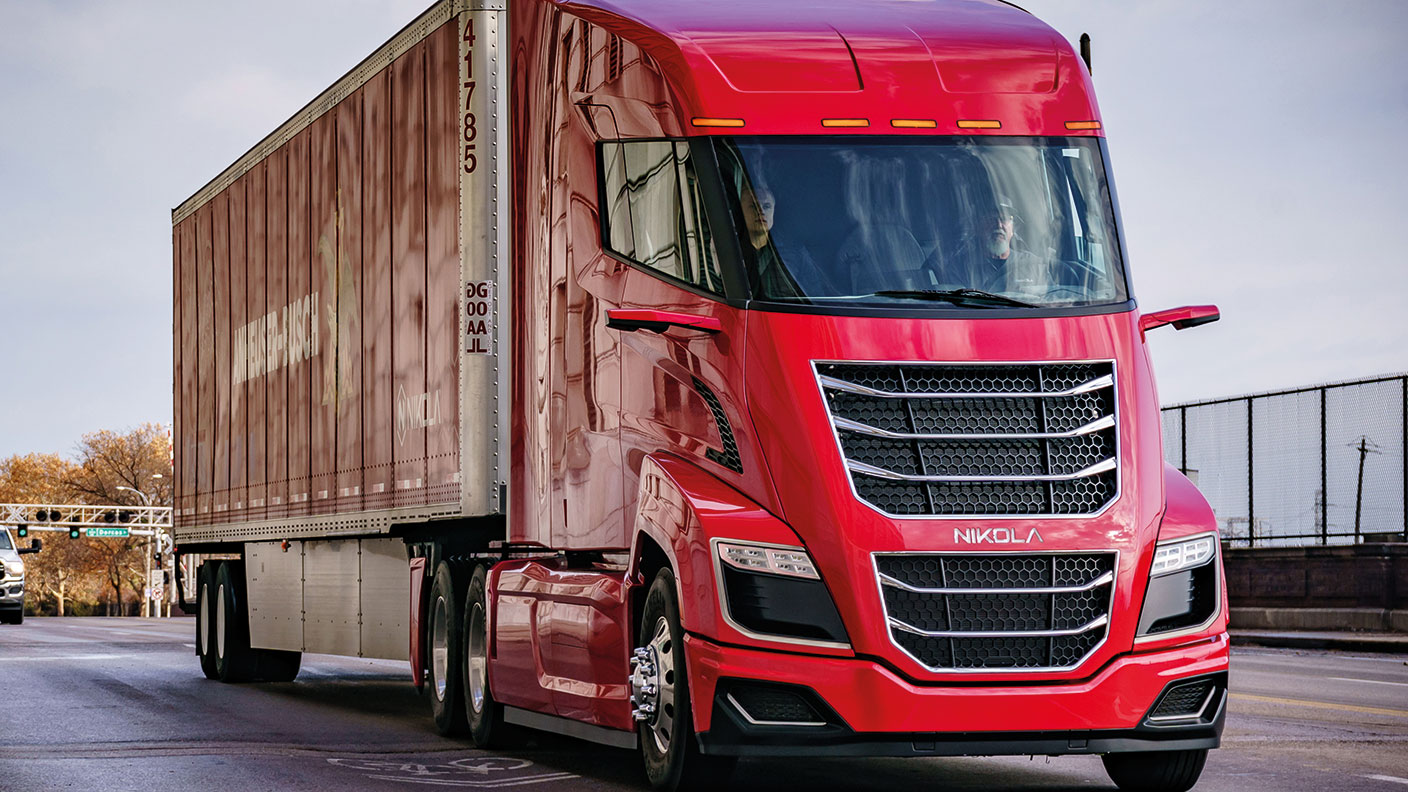Short electric-truck maker Nikola, the Tesla wannabe
Nikola, the electric-lorry maker, has yet to produce any trucks – and the share price looks ripe for a fall.


Get the latest financial news, insights and expert analysis from our award-winning MoneyWeek team, to help you understand what really matters when it comes to your finances.
You are now subscribed
Your newsletter sign-up was successful
Want to add more newsletters?
The jury may still be out on the long-term prospects of electric-car maker Tesla, with even founder Elon Musk admitting that it may be overvalued. But it has been one of the most successful investments of the past decade. The stock has risen 50-fold since it first went public in July 2010. No wonder, then, that investors have snapped up shares in similar companies, no matter how shaky their business model.
One such Tesla wannabe is lorry maker Nikola (Nasdaq: NKLA). Its founder and CEO Trevor Milton says that he wants to move both pick-up trucks and the haulage industry from petrol and diesel towards hydrogen power (hydrogen fuel cells convert the hydrogen into electricity, and there are no harmful emissions). The group also produces battery-powered electric vehicles. Milton claims that Nikola has already secured 14,000 orders for its trucks. Investors seemed to have hitched themselves to the company, with Nikola’s share price surging from $13 in May to a peak of nearly $80 before slipping back to the current price of $70.
Courting controversy
Despite this initial success, Nikola has already courted controversy, with Milton threatening to sue Bloomberg for libel. Milton claims that a Bloomberg article alleging that he misled investors in a presentation four year ago (by implying that a prototype Nikola articulated lorry that he showcased could be driven, when it was in fact missing key parts) is “misleading”. Prominent short-sellers such as Andrew Left of Citron Research have argued that Nikola is extremely overvalued. Nikola has even incurred the ire of Tesla’s Musk, who called its technology “staggeringly dumb”.
Try 6 free issues of MoneyWeek today
Get unparalleled financial insight, analysis and expert opinion you can profit from.

Sign up to Money Morning
Don't miss the latest investment and personal finances news, market analysis, plus money-saving tips with our free twice-daily newsletter
Don't miss the latest investment and personal finances news, market analysis, plus money-saving tips with our free twice-daily newsletter
Criticism from competitors and short sellers is one thing, but there are some solid reasons to be sceptical of Nikola. Firstly, it hasn’t actually produced anything yet. While it claims to have a significant number of pre-orders, it won’t start low-volume production of battery-powered electric pick-up trucks until next year, with the hydrogen-powered heavy goods lorries not arriving until 2023. Even its own projections admit that it will take time to build enough hydrogen fuel stations to make the technology attractive to haulage companies.
Nikola’s vehicles will also be launching into a market that is already extremely competitive. In addition to Tesla, big manufacturers such as GM and Ford are planning to launch electric pick-up trucks next year, alongside offerings from startups such as Lordstown, Rivian and Bollinger. Similarly, Tesla, Daimler and Nissan have either launched electric heavy lorries or want to do so soon. The upshot is that the shares should fall further. I recommend shorting them at the current level of $70 at £20 per $1. Given the high degree of volatility, I suggest a looser stop loss than normal, covering your position if they go above $115. This gives you a potential downside of £1,000.
Get the latest financial news, insights and expert analysis from our award-winning MoneyWeek team, to help you understand what really matters when it comes to your finances.

-
 Student loans debate: should you fund your child through university?
Student loans debate: should you fund your child through university?Graduates are complaining about their levels of student debt so should wealthy parents be helping them avoid student loans?
-
 Review: Pierre & Vacances – affordable luxury in iconic Flaine
Review: Pierre & Vacances – affordable luxury in iconic FlaineSnow-sure and steeped in rich architectural heritage, Flaine is a unique ski resort which offers something for all of the family.
-
 Should you sell your Affirm stock?
Should you sell your Affirm stock?Affirm, a buy-now-pay-later lender, is vulnerable to a downturn. Investors are losing their enthusiasm, says Matthew Partridge
-
 Profit from pest control with Rentokil Initial
Profit from pest control with Rentokil InitialRentokil Initial is set for global expansion and offers strong sales growth
-
 In the money: how my trading tips fared in 2025
In the money: how my trading tips fared in 2025The success of the open positions offset losses on closed ones, says Matthew Partridge
-
 Coreweave is on borrowed time
Coreweave is on borrowed timeAI infrastructure firm Coreweave is heading for trouble and is absurdly pricey, says Matthew Partridge
-
 Circle sets a new gold standard for cryptocurrencies
Circle sets a new gold standard for cryptocurrenciesCryptocurrencies have existed in a kind of financial Wild West. No longer – they are entering the mainstream, and US-listed Circle is ideally placed to benefit
-
 Profit from other investors’ trades with CME Group
Profit from other investors’ trades with CME GroupCME Group is one of the world’s largest exchanges, which gives it a significant competitive advantage
-
 Investors need to get ready for an age of uncertainty and upheaval
Investors need to get ready for an age of uncertainty and upheavalTectonic geopolitical and economic shifts are underway. Investors need to consider a range of tools when positioning portfolios to accommodate these changes
-
 How much gold does China have – and how to cash in
How much gold does China have – and how to cash inChina's gold reserves are vastly understated, says Dominic Frisby. So hold gold, overbought or not